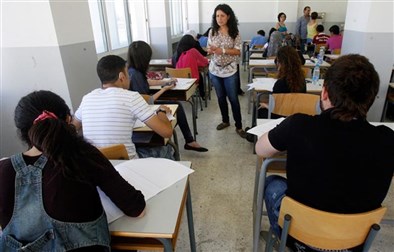source: english.al-akhbar.com
Author: Faten Elhajj
Layoffs are a recurring threat to Lebanon’s private school teachers. This year, some school administrations are disingenuously citing inflation and the government’s planned wage hike to justify the sackings.
Marie* made a grave mistake when she announced her marriage. Her 24 years of service at this particular private school did not spare her from a forced resignation. The school administration could not bear the burdens such a decision might entail: pregnancy, birth, maternity leave, and who knows what else.
When the dedicated teacher refused to resign, the management started threatening two of her sisters who work at the same school, even though they both have been working there for nearly 30 years.
When one inquires about such incidents at private schools, the ready response is often: “This is the case with ‘shady’ private schools, but not the private schools run by various religious institutions.”
To be sure, some schools have recently given their teachers allowances to cover the rising costs of living, which most private school teachers do not yet receive because the hike in the salary scale has yet to receive final approval from parliament.
At any rate, it seems that 10,000 out of 55,000 private school teachers are not receiving their dues in full. In many cases, these teachers’ salaries do not exceed half of what they should otherwise receive.
Benefits to teachers, such as gradually decreasing teaching hours, exceptional pay grades, and retroactive implementation of their pay raises, are all strange concepts to some private schools, let alone annual, sick, and maternity leaves, or bonuses for marriage and childbirth.
While the teachers’ salaries in those schools that abide by the law have increased by up to 20 percent over the past decade, the schools’ tuition fees have risen three-fold during the same period, according to figures from the Teachers Syndicate. According to the syndicate head Nehme Mahfoud, the teachers’ salaries are the “cheapest commodity” in these schools’ calculations.
Meanwhile, layoffs proceed as usual each summer, with up to 200 teachers dismissed by both “shady” and “prestigious” schools, according to Mahfoud. This year, however, schools are using inflation and the planned rise in the salary scale as a pretext to fire teachers.
Moreover, some schools have sacked teachers who were involved in the battle to get the salary scale amended, bearing in mind that Article 29 of the law stipulates: “It is considered abuse if any member of the teaching staff is dismissed for complying with the decisions of their union or demanding rights guaranteed to them by the law.”
In the meantime, it may be possible to sue some schools that deducted contributions from the teachers’ salaries, but did not pay them into theIndemnity Fund. According to Mahfoud, this is “brazen theft of the fund’s money.”
In a repeat of an old practice, some teachers are forced to resign ahead of time, and to sign documents stating that they had obtained all their rights, even if that’s not the case. A considerable number of schools deduct 6 percent of tenured teachers’ monthly salaries for the Indemnity Fund, but do not pay the deductions into the latter as required.
The teachers also suffer from the misapplication of Article 29, which gives the head teacher the right to fire any teacher, provided that the latter is given notice with confirmation of reception before July 5 each school year. Some schools justify layoffs by invoking the current economic crisis in Lebanon.
Yet this excuse does not convince the Teachers Syndicate. Mahfoud said, “It is not logical that 32 teachers were fired in one year without any notice by their school in Zghorta. The same goes for Sadeq Amlieh School, which fire 35 teachers this year. Even if their claims are true, should the teachers alone bear the brunt of this crisis?”
Mohammed Hamada, operations manager for the Amlieh Association said that the financial difficulties of the schools his association runs began 10 years ago.
“We have not been able to pay the 12 percent contribution to the Indemnity Fund and Social Security contributions since 2005,” he said. For this reason, the association’s hand was forced, as Hamada maintained, and closed down the free Sadeq School.
Father Boutros Azar, secretary-general of the Association of Catholic Schools, dismissed the claims of the Teachers Syndicate as “empty electoral propaganda” and “generalizations without mentioning specific cases.”
According to Azar, this does not mean that some schools had not dismissed teachers for disciplinary, educational, or economic reasons. Azar asked, “How will a school be encouraged to hire teachers when it is unable to provide them with enough students?”
Azar went on to say that the schools are concerned about the wage scale and the pay raise, but denied that the Private Schools Union sanctions in any form the arbitrary firing of teachers.
Contract Teachers in Public Schools: Discounted Salaries
This is not the first time that the finance ministry is deducting sums from the salaries due to contract teachers in public secondary schools. This happens at least once every year, and the contract teachers always receive the same answer each time they decide to take it up with the ministry.
One oft-cited explanation for it is a computer error, as the software cannot differentiate between contract and tenured teachers. But the contract teachers do not buy this, because if it was so, as we were told, then the error would have happened each time the payments were made.
According to Hamza Mansour, head of the central committee of secondary school contract teachers, the amounts being deducted this way range from LL600,000 to LL1 million ($400-$665).
Mansour said, “There is pilfering taking place under false pretenses or in the form of progressive taxes,” explaining that the supposed financial dues of contract teachers are manipulated in such a way as to subject them to a 15 percent tax, when the normal tax rate should not exceed 2 percent.
When the committee followed up the matter with the finance ministry, Alia Abbas, director of disbursements at the ministry, asked the committee to provide a letter from the director of the department of public secondary schools explaining the problem before dealing with the issue.
Sources in the education ministry said that there were 3,500 contract teachers this year, and that they are owed wages. Subsequently, the sources claimed, the ministry cannot double-check thousands of cases, especially since tax affairs are ultimately the purview of the finance ministry.
The Parliamentary Sub-Committee Studying the Salary Scale
The parliamentary sub-committee charged with studying the salary scale rejected the objections brought by the Economic Committees, which represent capitalists and employers in the country, against the wage hike. The committees claimed the wage increase would become a burden on the economy and aggravate the deficit.
However, to the sub-committee, the new salary scale is now a draft law, and negotiations over the principle of a pay raise across the board ended when the Lebanese government approved the scale. For this reason, the sub-committee asked the Economic Committees and the Central Bank to submit a detailed report explaining their concerns regarding the impact of the scale on the economic situation in Lebanon.
On Thursday, the sub-committee concluded its interviews with important stakeholders in the government and trade unions, and compiled a comprehensive dossier on the issue. As may be expected, the discussions revealed a huge disparity between the views of the Economic Committees and those of the Union Coordination Committee.
*A pseudonym.
image: Haitham Moussawi/ Al-Akhbar














